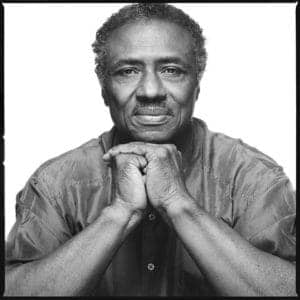
Supporters of Black liberation fighter and political prisoner Herman Bell held a packed news conference at the Center for Constitutional Rights March 23. They came out to show support for a recent New York State Parole Board decision to free Bell after more than 40 years – much of it spent in torturous solitary confinement.
The board’s decision has come under attack from police groups, the corporate media and elected officials, including “liberal” Democrats Gov. Andrew Cuomo and Mayor Bill de Blasio.
Speakers, representing a broad coalition of prisoners’ advocates, public officials, artists and activists, called for an end to this interference and for the Parole Board to stand by its decision to release Bell, who is now 70.
Bell’s attorney, Robert Boyle, read a statement supporting parole from the son of one of the cops killed in a shootout with Bell in 1971. Boyle pointed out that his client has met all the criteria for release.
Boyle also condemned the politicians and media for inflaming hateful pro-cop propaganda. He compared the campaign against Bell to the way Hillary Clinton’s racist rhetoric about “super-predators” aided the mass incarceration of a generation of Black and Brown youth.
Speakers, representing a broad coalition of prisoners’ advocates, public officials, artists and activists, called for an end to this interference and for the Parole Board to stand by its decision to release Bell, who is now 70.
New York State Assembly member Charles Barron declared: “I have a message for the governor and mayor: ‘Shut up! Shut up and let justice prevail.’”
Among the many speakers and supporters were Bina Ahmad of the National Lawyers Guild, New York State Sen. Kevin Parker, CCR Board member Lumumba Bandele, and Pam Africa of the International Concerned Family & Friends of Mumia Abu-Jamal.

Will freeing Herman free the other aging Panthers?
The Intercept explores what hope Herman’s freedom might give the other Panthers still held behind enemy lines:
“Bell’s eighth [parole] hearing was an important litmus test for whether the parole board, which this year includes five new commissioners, would follow its own guidelines or bend, once again, to the political will of police unions and politicians, who make no secret of their desire to see the aging Black Panther die in a cage. In 2017, parole board administrators brought in new regulations in an attempt to instantiate what should have long been standard practice: basing parole decisions on an evaluation of the inmate’s risk to the public instead of the nature of the crime that led to their incarceration.
“The fact that the board now faces fierce backlash and pressure to reverse its decision from powerful police unions and politicians risks stymying further steps in the right direction when it comes to freeing inmates like Bell.
“Bell was convicted along with two co-defendants in 1975 for the murders of officers Joseph Piagentini and Waverly Jones. He was sentenced to 25 years to life. During his decades of incarceration, he’s earned degrees, launched educational programs, mentored fellow inmates, and also maintained close friends, a loving marriage, and a family. Beyond prison walls, he’s organized community gardening projects and homeless youth outreach initiatives. For the officers’ murders, he has expressed remorse and taken responsibility.

Bell is one of 15 former Black Panthers still incarcerated in the U.S., most of whom were also convicted of murdering law enforcement officers in the 1960s and ’70s, at a time when the government targeted Black liberation fighters with ferocity. Since 2000, eight former BPP members have died while incarcerated; most were in their 50s and 60s. Albert Washington, one of Bell’s co-defendants, died in 2000 of liver cancer, at age 64. Long-term incarceration is said to add 10 years to a person’s physical age, and at 70, Bell is in an age bracket with a recidivism rate of less than 4 percent, according to DOCCS statistics. …
“Bell is the first former Black Panther convicted of murdering a police officer to be granted parole. If the parole board continues to follow its own regulations, he should not be the last.”

What we can do right now
Readers are urged to take action to support Herman Bell. Here are three things you can do RIGHT NOW:
- CALL New York State Governor Cuomo’s Office NOW: 518-474-8390
- EMAIL New York State Governor Cuomo’s Office: www.governor.ny.gov/content/governor-contact-form
- TWEET at Gov. Cuomo: Use the following sample tweet: “@NYGovCuomo: Stand by the Parole Board’s lawful & just decision to release Herman Bell. At 70 years old and after more than 40 years of incarceration, his release is overdue. #BringHermanHome.
Script for phone calls and emails:
“Governor Cuomo, my name is __________ and I am a resident of [New York State/other state/other country]. I support the Parole Board’s decision to release Herman Bell and urge you and the Board to stand by the decision. I also support the recent appointment of new Parole Board Commissioners and the direction of the new parole regulations, which base release decisions more on who a person is today than on the nature of their crime committed years ago. Returning Herman to his friends and family will help to heal the many harms caused by crime and decades of incarceration. The Board’s decision was just, merciful and lawful, and it will benefit our communities and New York State as a whole.”
Greg Butterfield writes for Workers World, where this story first appeared. Bay View staff contributed to this story.





